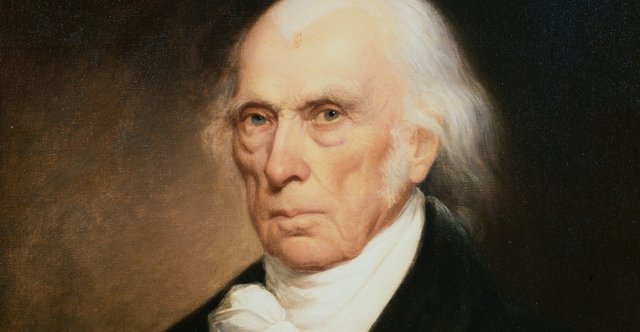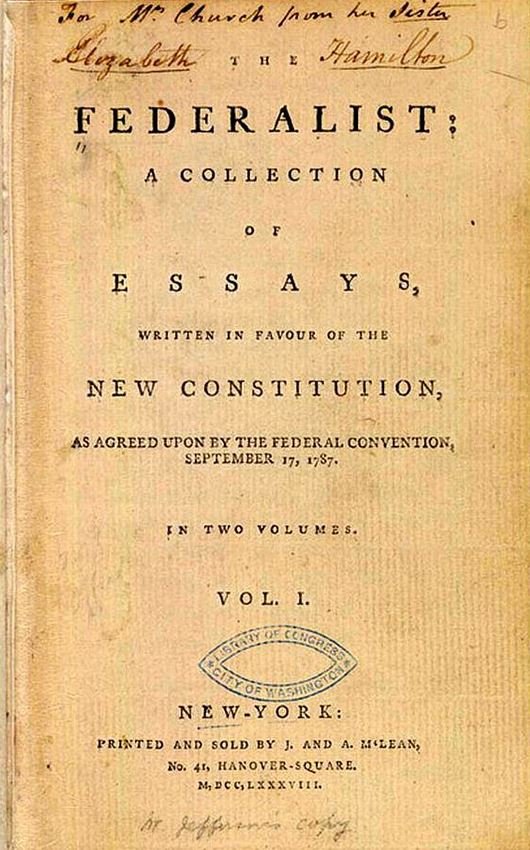My Take On Federalist 10 By James Madison
My attempt at interpreting the arguments of Federalist 10...
Madison starts with offering that one of the many benefits to having an established a Union is its ability to “break” or control the violence of divisive or “factious” forces, which he points out to possibly be the most dangerous threat to the republic. Madison proposes that confusion and injustice have been the downfall to many government works and that the friend of popular government must provide a cure for the danger of faction but at the same time not violate the principles he himself is attached to. He admits that it is a difficult challenge to resolve both the issues of the impassioned, overbearing majority while maintaining the right’s of minorities versus the issues posed on the other hand in which the government is too weak to ensure and act in the entire people’s interest or the public good, setting up his argument that there needs to be enough power in the government to stop destructive, factious spirit that will inevitably arise and could potentially spell demise for the nation.

On that note, he begins to explain why it is the nature of a society to become divided by passions, interests, or beliefs. His reasoning be that if a government is to completely abolish factions it would have to destroy liberty or secondly, it would have to some how enforce that every citizen behave and think in the same way. The first solution he describes as unwise for liberty is far more important and essential than it is to have a country with a “uniformity of interest”. Secondly, if we are to have liberty, it is natural that man is diverse in capability, thought, interest and passion and this will play out as larger groups in society. Some of who will share and oppose each others’ interests, thus making a uniform party impractical.
He goes further in describing a free society as factious almost in its very fabric. With this in mind, he makes a point that no group of men should be both judges and parties. This is a dilemma because often law is affecting groups, not just individuals, and there will certainly be a multitude of different groups jockeying for their interests, and some of which will diverge from the interest of the public.
.jpg)
The idea that the “causes” of faction are essential, but it is the duty of the government to control those “effects” to its best ability is put forth. A faction that has a majority is of his prime concern, as it may sacrifice the interest of the public for it’s own, which is one of the many reasons why he marks a pure democracy as inferior. Madison offers that a republic is a way to hinder the tyranny of the majority and that by increasing the amount representatives it reduces the chance of ‘a cabal of a few’ from subverting the will of the people. Yet, at the same time, too many representatives will cause disorder. He argues a republic will allow for greater number citizens over an also greater area as well. He continues to contemplate the dilemmas of the downsides to both having many electors as opposed to fewer, local ones or having fewer representatives opposed to more. Still Madison holds that as a republic is advantageous to a democracy, a large republic is to a small republic, and though the republic they’ve established is not perfect, it would prevent “improper or wicked projects” such as the equal distribution of property or paper money to engulf the entire country and more likely only a smaller area such a state or district. Proudly he states this to be the best defense against factions who have other interests at heart rather than the people’s.
Afterthoughts...
This is my interpretation of Federalist 10 written by James Madison, please let me know if you think I missed anything, if you disagree, or have a different take. This is the first I've read of any of the Federalist Papers and a couple times through out reading it, I was taken aback by his thoughts and ability to extrapolate. And still I need to reread it because the vocabulary was very challenging for me and I know some passages just went over my head.

As someone who is unsure in the legitimacy of government, I found the read very satisfying. Generally, it gave me a newfound respect for understanding, intellect, humility and integrity of our founding fathers, men who risked it all. In my eyes, it is hard to see a world in which we have no governments, but I believe evolutionarily speaking, we are moving towards more decentralization, more freedom and perhaps one day, it would be possible to achieve a peaceful anarchy. But with so many nefarious, violent "factions", or evil interests, it seems hard to be able to defend a free society with out a powerfully unifying government. Let me know what you all think! I'll just end with an excerpt that I found quite striking:
A rage for paper money, for an abolition of debts, for an equal division of property, or for any other improper or wicked project, will be less apt to pervade the whole body of the Union than a particular member of it; in the same proportion as such a malady is more likely to taint a particular county or district, than an entire State.
🐸 GAB @newtreehints
🐦 TWITTER @newtreehints
🎬 DTUBE @newtreehints
📷 NSTGRM @newtreehints
Exclusive 30 days free upvotes to your every new post. No need to send any kinds of steem or sbd its full free service. we have paid service too so please check them too. Active the free upvote service and learn more about it here : https://t.co/JCv10Zv8sw
What was common knowledge than, but extremely hard for us modern day researchers to comprehend is why "the meek shall inherit the earth". A Biblical phrase not often examined in today's world. They have changed the definitions of the words seeking to hide the truths written in the Federalist Papers and the Anti Federalist Papers.
One can find the truth by looking up the etymology of the words. For instance the world "shall" was used in order form. Shall not means not do. Today in the defacto conspiracy corporations color of law (no Law) courts they reinterpret the meaning as may. This is exactly how they go about destroying the original intent of the founding fathers.
The only recourse a researcher has is to find sources for the time. Webster's Dictionary is a great source if published in the time. Black's Law Dictionary 4th addition is a great source, but it too has been corrupted. nationallibertyalliance.org has a great repository of historical data. Their are many organizations that have great sources.
As far as the subject of this post. One needs to revisit the none aggression principal to fully understand Jefferson's argument. One must remember that in all occurrences where violence is involved he who is defending is not committing violence. The initiator creates the right of the victim to use whatever force is necessary to put the initiators violence down. This is merely one of the principals that is being written about. To understand one must realize they are speaking about Gods law the one written on everyone's heart. As a Deist Jefferson would know all about the laws written in the hearts of men.
Words to look up the meaning, etymology of.
violence = none aggression principal.
Justice = doesn't exist today and if you don't comprehend this well???
Violate = a form of violence, but important that you look up the entomology.
principles = None transferable, can't contract them away = fraud
society: what constitutes a viable society
republic = the tool that provides the will of the people allowing them to consent to governance.
ratification = contract if ratified turns what the legislators write into law.
"With this in mind, he makes a point that no group of men should be both judges and parties." = The origin of Separation of powers in American Jurisprudence.
Just my opinion about a democracy. It can be described as a pig pin, which is why I don't want any walls at the boarder.
Yes, it was a great read, I plan on reading more of them. Yes, I've just began to embrace the bible with an open heart only the past year really and've got a ways to go still... It's hard to express how deep and universal its application seems to be.. And I'm taking a course in politics, my main hope's becoming a chiropractor in the long term as a side note, point is my teacher argues that the founders had no consensus and that the constitution's written so that it is to be ( I wonder if he thinks by design or not..) vague and/or flexible to the whims of those in charge... And I think it goes back to this abuse of definitions you point out so correctly...Orwellian stuff.. they said specific things in regard to war, money, our rights... What do you think of corporations? It's sad really, my teacher's world view has to exclude the federal reserve, cia, wikileaks, false flags, media consolidation..
It is good that you are embracing the bible. It is the best teacher when it comes to politics, social cultural traditions and law. One also must have God in mind to understand the laws written in your heart and how those laws translate into right action. As a deist I am greatly at a disadvantage it seems.
Your teacher is totally wrong about the founders being vague. Everything in the constitution was written in no uncertain terms. Is why the changing of the definitions and they did it by making children go to indoctrination camps called schools, which is proof that freedom doesn't rain in America.
Just reading the Federalist Papers and the Anti-Federalist papers is not enough. One must make the effort to comprehend the world they lived in. What you discover is that the founding fathers might as well have been prophets or maybe the enemy was listening in.